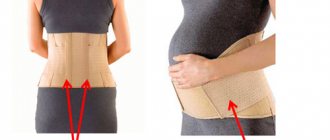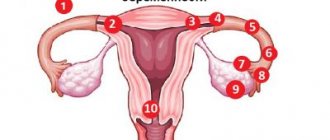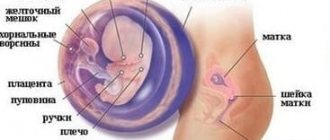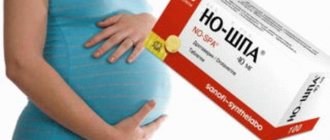The most common cases of complaints of tingling in the lower abdomen are observed during pregnancy. Stitching pain and tingling in the abdomen appear with a disease such as intestinal diverticulitis. Tingling in the lower abdomen may not be related to gynecology. Inflammation of the appendages may also accompany tingling in the abdomen.
Similar symptoms can be observed at different periods of life: before menstruation, in the middle of the cycle or during pregnancy. Discomfort in the lower abdomen is most often associated with gynecological problems. True, in some cases this may also be a sign of problems with the urinary system or intestines. It happens that a woman has a tingling sensation in her lower abdomen before her period.
Disturbance in the gastrointestinal tract
For girls who do not intend to become mothers in the near future, tingling may indicate a common cold. If the discomfort in the lower abdomen is short-term and does not recur too often, then there is no need to sound the alarm.
Tingling and discomfort in the lower abdomen is a common symptom, characteristic of both women and men. In women, tingling in the abdomen may indicate natural processes such as menstruation or pregnancy. One of the common causes of tingling in the lower abdomen is appendicitis. It can occur in both women and men.
Diseases of the genitourinary system
Systematically occurring tingling sensations in the lower left abdomen in men indicate that not everything is in order with the reproductive system.
Possible diseases include the following:
- inflammation of the prostate gland;
- cystitis;
- inflammation of the urethra;
- inflammation of the seminal vesicles;
- prostatic hyperplasia.
Tingling in the abdomen signals the development of prostatitis. This is the common name for inflammation of the prostate gland.
A few decades ago, this pathology was considered age-related, but today it affects men in the prime of life and desires.
Inflammation of the bladder, like the urethra, can occur for various reasons. These are serious diseases that need to be treated without delay.
Photo:
Practice shows that postponing treatment will not work. Tingling in the abdomen only portends more acute pain and consequences.
It doesn’t matter at all which side, left or right, the pain is indicated. It is important to respond to these signals in a timely manner.
The correct reaction is to contact a urologist, who will make the appropriate diagnosis. Often, to find out the cause, it is necessary to perform a comprehensive examination of the body.
Today, prostate adenoma has a new name - prostatic hyperplasia. At this stage of the development of the disease, the unpleasant tingling sensation in the abdomen intensifies and turns into nagging pain.
For men, this is a serious condition that can only be overcome after targeted treatment. It also happens that blood appears in the urine.
READ How to get rid of bloating during pregnancy?
At the same time, painful sensations are recorded either in the left or in the right side and become intolerable.
Observations show that sometimes tingling in the lower abdomen appears at the stage of exacerbation of a chronic disease, so you need to respond to signals of this kind with complete seriousness.
Pathologies of pregnancy
In addition to Crohn's disease, the intestines can signal possible diverticula and tumors. In acute appendicitis, discomfort in the lower abdomen is replaced by sharp pain. The person may experience attacks of nausea and vomiting. An increase in temperature is also possible.
Unlike men, tingling in the lower abdomen for women is a characteristic symptom of the first trimester of pregnancy. However, during a normal pregnancy, a woman may feel a slight tingling sensation on the right side. Tingling in the lower abdomen, in this case accompanied by severe pain. Painful sensations come from the right and have a pulling or aching character.
How and why does the lower abdomen hurt?
Many years of practice in treating various diseases convincingly proves that tingling in the lower abdomen is not always a signal of the development of some pathologies in the body.
In women, this is often associated with physiological processes. The monthly cycle of endometrial renewal is almost always accompanied by painful sensations in the lower abdomen.
The physiology of the body in men is structured differently. For them, even a slight tingling sensation in any side, right or left, serves as a clear signal about the development of an infectious or inflammatory process. It follows from this that the reaction to these signals must be appropriate.
When a patient visits a doctor, he needs to clearly explain his condition and the characteristics of the discomfort that has arisen. First of all, this applies to men.
Tingling in the lower abdomen can be felt on both the left and right. If we talk about women, then gynecologists are able to determine in general terms the nature of the pathology without additional explanation.
Although in this case it is necessary to strictly adhere to certain terminology.
Experts distinguish the following types of pain:
- aching and pulling;
- especially sharp and cutting;
- with periodic tingling.
In order for the attending physician to receive a sufficient amount of information to make a diagnosis, it is necessary to correctly characterize your condition.
It often happens that the source of pain is difficult to determine. Tingling in the lower abdomen appears either in the right or left side.
Photo:
It is impossible to independently determine the causes of wandering pain at home, and it is even more unacceptable to prescribe treatment for yourself.
READ Why does a newborn's stomach gurgle?
First of all, this rule applies to men.
Experts know that similar sensations occur in the following diseases:
- problems in the genitourinary system;
- problems with gastrointestinal tract dysfunction;
- problems of the musculoskeletal system.
In women, diseases of the pelvic organs and the reproductive system as a whole are added to this list.
According to medical statistics, tingling in the lower abdomen in women is largely associated with gynecology. These causes account for 60% to 70% of diseases.
The situation is much more complicated for men. With age, the reproductive system becomes the weak link in a man's body.
At a certain stage, a serious disease such as prostatitis appears.
Very often a person does not even suspect the presence of this pathology, explaining the problems that arise with a cold or overwork.
Gradually, pain appears in the left side, and radiates to the groin and rectum. As a result, you have to go to see a urologist.
Intestinal diverticulitis
Sometimes pain on the right side, as well as tingling in the lower abdomen, are signs of Crohn's disease. This disease is dangerous for both women and men. In addition to pain on the right side, this disease is characterized by an inflammatory process in the intestines. The causes of Crohn's disease are disorders of the immune system.
The danger with this disease is ulcers that form on the intestines during the development of the disease. Also, with intestinal tumors, problems such as obstruction and bleeding are possible. In many cases, these symptoms indicate malignant tumors.
However, it is characterized by frequent constipation and is located in the left abdomen. A disease such as diverticulitis is especially dangerous due to the formation of suppuration in the intestines and the development of fistulas.
Tingling in the abdomen is accompanied by paroxysmal pain. During the development of diseases of the upper urinary tract, pain and tingling in the abdomen radiate down to the groin. Sometimes the patient feels sharp pain when urinating. I'm pregnant now, 8 weeks, I feel tingling in my lower abdomen. Pain in the lower abdomen can occur through factors that serve as irritants.
Please note that pain and tingling in the lower abdomen often occurs from overload or exercise. Pain in the lower abdomen varies in nature, but can be a consequence of the disease. They are divided into types: - sharp and dull; - cutting; - pulsating; - colicky; - aching; - bursting. The pain can spread to all parts of the abdomen. Very often, women go to the gynecological office with complaints of discomfort in the lower abdomen: nagging pain, tingling in the lower abdomen, etc.
If there is a serious pathology, the tingling in the abdomen is sharp and sometimes acute. A slight tingling sensation in the lower abdomen in this case is normal.
Pregnancy is accompanied by certain changes that affect various organs and functions in a woman’s body. This often leads to not entirely pleasant sensations during the period of bearing a baby. But this situation is quite normal and does not require increased concern. It’s another matter when there is a risk of pathological conditions that manifest themselves with a similar clinical picture. In this case, you need to be careful and consult a doctor if you have any concerns.
This also happens when women are bothered by tingling in the lower abdomen during pregnancy. This can happen at different times and under the influence of a large number of factors. It is always necessary to assess the risk of certain manifestations, since the health of the expectant mother and child may depend on this. It is possible to say what actually causes such sensations only after consulting a doctor.
When there is a stabbing sensation in the abdomen during pregnancy, all the causes of such manifestations should be taken into account.
Recovery after placental abruption
This pathology poses a threat to the life of the child and mother, so doctors leave women under observation in the hospital. Preservation of pregnancy in this case is simply necessary. The same is done when signs of possible detachment are detected.
After staying in the clinic, expectant mothers need to take special care of their situation, rest more, and also stop going to work if possible. Heavy mental activity can lead to stress and chronic fatigue.
Placental abruption often occurs in those women who prefer an active lifestyle and do not consider pregnancy a reason to change it. After doctors eliminate the threat of miscarriage, you need to switch to bed rest and spend time thinking about the baby and his health. To avoid tingling in the lower abdomen during pregnancy, you need to think only about the good and not be afraid of the upcoming birth.
Causes
In most cases, tingling in a woman’s abdomen during pregnancy is due to physiological reasons. Then you should not worry, but you should try to calmly survive these phenomena. They cannot pose any danger. But you have to act completely differently if the pain is associated with pathological processes, which often affect the very process of bearing a child. Therefore, at the stage of the initial examination, it is extremely important to know the causes of this condition. And abdominal pain can be the result of the following factors:
- Physiological changes.
- Ectopic pregnancy.
- Spontaneous abortion.
- Diseases of the digestive system.
- Pathology of the urinary system.
- Gynecological diseases.
- Infectious diseases.
Given the variety of causes of discomfort in the lower abdomen during pregnancy, the doctor needs to focus on the differential diagnosis of conditions with similar symptoms. A complete clinical examination of the woman helps with this.
The origin of stabbing abdominal pain during pregnancy is difficult to predict. If for some women this is the norm, for others it is a sign of pathology. Therefore, you should always seek advice from a doctor.
Pulsation in the lower abdomen
Sharp tingling sensations in the lower abdomen during pregnancy are often pulsating in nature. After the second trimester, such pain may indicate placental abruption. This pathology threatens the condition of the fetus and requires medical intervention. If partial placental abruption has occurred, it is still possible to save the child’s life. Even the presence of slight bleeding will not pose a serious problem to his life if he arrives at the hospital in time. Separation of more than a quarter of the placenta is considered a mortal threat. If there is throbbing pain, you should urgently call an ambulance and stick to bed rest. If you do not take care of yourself after such hospitalization, you can provoke a miscarriage.
Symptoms
During the examination and objective examination, all symptoms are analyzed in order to have a holistic picture of the clinical picture. The correct diagnosis can be made based on a medical examination, and additional methods can clarify it.
As for pain sensations, first of all you need to establish their characteristics:
- By localization: lower abdomen, lateral or upper sections.
- By duration: short-term and long-term.
- By frequency: periodic or constant.
In addition, their dependence on external factors, food intake, and movements should be taken into account. It is also necessary to take into account other symptoms that accompany the tingling sensation in the abdomen. Every detail is important to make a diagnosis. This will allow differentiation of similar conditions from each other. Therefore, it is worth considering the signs of the most common conditions that can cause tingling in the lower abdomen during pregnancy.
Physiological changes
During pregnancy, hormonal changes are observed already in the early stages, which consist of an increase in the concentration of progesterone, estrogens and relaxin. As a result, muscles relax, ligaments and tendons soften, which prepares the body for the growth of the uterus. Already in the second trimester, an increase in the size of the abdomen becomes noticeable, which will naturally lead to the appearance of various unpleasant sensations, including stabbing pain.
In the later stages, the situation may worsen as the uterus begins to put pressure on surrounding organs. Women are worried about constipation, frequent urination, and shortness of breath. When it's time to give birth, stabbing pain in the lower abdomen may indicate contractions are starting.
If pregnancy is progressing normally, then you should not pay attention to a slight tingling sensation in the lower abdomen.
Ectopic pregnancy
In the early stages, pain in the lower abdomen may indicate an ectopic pregnancy. This happens when the fertilized egg attaches in other areas: tube, ovary, abdominal cavity. The first option is the most common. In this case, everything proceeds normally until the wall of the tube begins to stretch as the embryo grows. Then the following symptoms appear:
- Aching pain in the lower abdomen.
- Bloody issues.
- Pain on palpation and gynecological examination.
In this situation, there is a danger of pipe rupture. Then signs of internal bleeding appear: pallor, increased heart rate, decreased blood pressure, dizziness. The abdominal muscles tense, and signs of peritoneal irritation are noted.
Spontaneous abortion
Another obstetric pathology cannot be ruled out - spontaneous abortion. You can think about this when discomfort bothers a woman before 20 weeks of pregnancy. Then the following symptoms appear:
- Pain in the lower abdomen.
- Bloody issues.
- Hypertonicity of the uterus.
- Opening of the uterine os.
This situation is easiest to stop at the stage of threat of miscarriage. If this is not done, the process will develop further - up to the complete loss of the fetus.
Digestive diseases
It is logical to assume that abdominal pain may be associated with diseases of the digestive system. Most often the stomach, intestines, gallbladder or pancreas are involved in the pathological process. Depending on the pathology, the clinical picture will have characteristic differences, but the most common symptoms are the following:
- Pain in various parts of the abdomen: epigastrium, hypochondrium, lateral or lower sections.
- Nausea.
- Vomit.
- Belching.
- Constipation or diarrhea.
- Bloating.
It is also necessary to note some features of symptoms in various diseases. Pancreatitis is accompanied by girdle pain; with cholecystitis, it often radiates to the area of the right shoulder girdle, and with a peptic ulcer, it is usually localized at one point with possible irradiation to the back.
Diseases of the gastrointestinal tract often worsen during pregnancy. Like any pathology, they require adequate treatment.
Pathology of the urinary system
Tingling in a woman’s abdomen during pregnancy can also be associated with diseases of the urinary organs. The most common symptoms encountered are pyelonephritis or cystitis. This is due to the influence of an enlarged uterus and hormonal levels. In this case, you may notice the following signs appear:
- Pain in the lower back or suprapubic area.
- Frequent urination.
- Change in urine color.
- Increased body temperature.
These diseases are mainly of microbial origin, and therefore the diagnosis is confirmed not only clinically, but also by the results of a urine test identifying bacteria in it.
Treatment
Having identified the causes of tingling in a woman’s stomach during pregnancy, it is necessary to immediately begin treatment measures. Their volume and nature will depend on the diagnosis and condition of the body. Most often they are limited to conservative means, but there are situations when there is a need for surgical intervention.
The potential impact of treatment on the fetus is always taken into account. Only the safest ones are used.
Diet
Everyone knows that during pregnancy a woman must eat properly. But when there are prerequisites for the development or exacerbation of certain diseases, then you need to pay special attention to the diet. This will help not only in the development of the fetus, but also ensure the woman’s well-being. So, you should follow these rules:
- Eat regularly and nutritiously.
- Food should be varied and of high quality.
- Avoid spicy, fried, fatty and smoked foods.
- Limit pickles and marinades, baked goods.
- Give preference to baked, boiled or stewed food.
- Limit consumption of cabbage, legumes, and carbonated drinks.
- Drink enough fluids.
- Stop drinking alcohol.
Drug therapy
Medicines are of primary importance in the treatment of diseases. But during pregnancy, it is necessary to be careful when using them, due to the possible impact on the condition of the fetus. A woman should not worry, however, since doctors use only proven medications that have a large evidence base confirming their safety. Depending on the situation, the following groups of drugs are recommended:
- Antispasmodics.
- Tocolytics.
- Hormones.
- Adsorbents.
- "Anti-foaming agents."
- Enzymes.
- Antisecretory.
- Vitamins.
- Herbal medicines.
The doctor will determine which specific drug to prescribe, its dosage and course of administration. You cannot take medications on your own - this can harm not only yourself, but also the child.
Physiotherapy
In some cases, physiotherapy is indicated. Most often they are recommended as part of the treatment of miscarriage. In addition, certain methods can be used for various chronic diseases in remission. Therefore, the following procedures should be considered:
- Electrophoresis.
- Electro-relaxation.
- Reflexology.
- Balneotherapy.
The optimal course of treatment will be prescribed by a physiotherapist together with a gynecologist. If any unpleasant sensations arise during the procedures, you should consult a specialist.
Operation
When a woman is diagnosed with an ectopic pregnancy or an abortion in progress, surgical methods cannot be avoided. In the first case, laparoscopic surgery is used to remove the fertilized egg. If complications arise in the form of internal bleeding, then you will have to undergo an intervention from an open approach. After an abortion, it is necessary to undergo curettage of the uterine cavity so that there are no membranes left there. Otherwise, you can expect severe bleeding or infection.
When a tingling sensation appears in a woman’s abdomen during pregnancy, this requires consultation with a specialist. Only a doctor can say what they are connected with, and if pathology is identified, prescribe appropriate treatment.
Some expectant mothers experience tingling in the uterus during pregnancy.
Like any unpleasant sensation, this begins to bother women, so they need to know what it is connected with and whether it is dangerous for the child.
Tingling in the uterus during pregnancy: causes
During pregnancy, a woman's body changes greatly. Such changes sometimes bring new sensations, which, unfortunately, are not always pleasant. Tingling in the uterus during pregnancy is one of these sensations. If there are no accompanying signs, then this is a completely normal and understandable phenomenon.
The main causes of tingling in the uterus during pregnancy can be identified:
1. Normal tingling or physiological, they do not pose any threat.
2. Dangerous tingling sensations, they are usually always accompanied by additional symptoms.
Help with physiological pain
The muscle tissue that supports the growth of the uterus is very elastic. Therefore, you don’t have to worry about stretching it. During pregnancy, the female body produces a huge amount of the hormone relaxin. It has a beneficial effect on the condition of the muscles and the dilation of the cervix during childbirth.
To avoid tingling, it is enough to ensure proper rest. There is no need to overwork, carry heavy loads or walk for hours. For the full development of the child, as well as the health of the expectant mother, it is enough to allocate 1 hour for a walk in the fresh air. After consulting with your doctor, you can try wearing a bandage, which will ease the load on the back and pelvic muscles.
Physiological reasons
As a rule, they occur at night or in the evening, but pass quickly, and most importantly, do not affect the condition of the pregnant woman in any way. The causes of tingling may vary depending on the stage of pregnancy.
The main tingling sensations in the first trimester:
1. During the implantation period, many mothers may feel tingling in the uterus.
2. The ligaments that support the uterus may become stretched. In this case, tingling may be felt in the groin, and it will intensify when making sudden movements. By changing your body position you can get rid of the tingling sensation.
3. Abdominal muscles are tense. Due to the fact that the uterus is constantly growing, the anterior abdominal wall stretches, and this is the cause of discomfort.
Causes of tingling in the second trimester:
1. The growing uterus puts pressure on the internal organs, thereby causing tingling. Associated symptoms may occur, such as gas and constipation.
2. In the second trimester, the body begins to prepare for childbirth, and this continues in the third trimester. The tingling sensations are chaotic, and, as a rule, they are not even paid attention to. After a little rest, relief will come.
Tingling in the third trimester:
1. The uterus is preparing for childbirth. In the third trimester, preparation becomes more noticeable and therefore felt stronger.
2. Precursors of labor are constant tingling in the uterus.
Physiological causes go away on their own with a change of position or rest, and no medical intervention is required.
Dangerous tingling in the uterus during pregnancy is usually accompanied by other symptoms that you need to pay attention to:
1. Along with tingling sensations, body temperature rises.
2. Diarrhea.
3. Nausea or severe vomiting.
4. Brown or red discharge appears from the vagina.
5. Tingling does not stop for a long time.
6. When urinating, severe pain occurs.
Non-obstetric reasons
It is necessary to take into account the fact that in addition to the uterus, other organs are located in the lower abdomen. In exceptional situations, they are the ones that cause tingling and discomfort:
1. Neurogenic bladder - despite the fact that urination becomes more frequent, there is no inflammatory process. For a pregnant woman, this is the norm, which is associated with changes in hormonal levels.
2. Cystitis - as a result of inflammation of the bladder, severe tingling occurs. In this case, treatment is required.
3. Appendicitis - its occurrence during pregnancy is extremely dangerous. There is a strong stabbing pain radiating downwards. If you suspect inflammation of appendicitis, you should call an ambulance as soon as possible.
The symptoms listed above are dangerous for the fetus and must be reported to your gynecologist. If necessary, treatment should be carried out in a hospital or at home.
After tingling occurs, you need to carefully listen to your body.
Tingling in the lower abdomen during pregnancy: first aid
If you experience strange tingling sensations in your uterus during pregnancy, be sure to call your doctor and make an appointment. In order to alleviate your condition a little before visiting a doctor, you need to use simple tips:
1. Thanks to this exercise, you can relax tense intimate muscles
. Gently get on all fours, rest your elbows and knees on the floor, your torso should be parallel to the floor. Bend your back slightly at the lower back, at this moment raise your head up, and gradually straighten your arms. You need to stay in this position for a few seconds. When performing the exercise, you need to carefully listen to how you feel. If the tingling suddenly gets worse, stop and call an ambulance. But if there are no changes, continue doing the exercise. In order to consolidate the effect, you can bend slightly forward and backward.
2. Pregnant women are not recommended to take any medications,
however, some medications may still help. The safest medicine is No-shpa. Drotaverine, the active substance included in the medicine, soothes muscle spasms in the uterus. But remember that if the pain does not go away after taking the pill, visit your doctor.
3. Don’t forget about breathing exercises
, you need to master it at the pregnancy planning stage. Exercises in which you regulate the frequency of exhalation and inhalation will help cope with toxicosis. Take a comfortable position, preferably sitting, straighten your back well and relax your shoulders. Try to breathe very quickly, but rhythmically. After some time, you will feel the muscles relax.
Despite the fact that during pregnancy many women become suspicious and worry about literally every reason, tingling in the uterus still cannot be ignored. Well, if the whole thing is physiological, then the woman in labor will be able to breathe a sigh of relief. But if the tingling sensation is associated with a disease, you need to get rid of it.
Tingling in the lower abdomen during pregnancy: when to see a doctor
There are situations in which the intervention of medical personnel is simply necessary. Every woman can distinguish ordinary tingling sensations from the manifestation of any disease; just listen carefully to how you feel. It is imperative to consult a specialist if the following symptoms occur:
1. There is a discharge similar to blood from the vagina.
2. The uterus has been tingling for more than an hour and the discomfort is only getting worse.
3. There is a feeling of tension in the uterus.
4. Severe discomfort when urinating.
If the pregnancy proceeds without complications, then red discharge indicates that placental abruption has occurred. Moreover, the problem can arise in any trimester.
If the tingling does not go away on its own, be sure to call an ambulance. If you feel tension in the uterus, you need to be wary. This may mean that the likelihood of miscarriage is high.
Dangerous symptoms during pregnancy
A stabbing and pulling sensation is not always a functional disorder. In some situations, this indicates the development of pathology and the impending threat of termination of pregnancy.
If a woman feels something is wrong, you need to pay attention to other symptoms such as:
- increase in temperature to 38-39 degrees, chills and fever;
- painful sensations that do not go away for more than two to three hours;
- aching feeling in the sacral and lumbar area;
- diarrhea, nausea and vomiting;
- unusual discharge. They can be watery, curd-like, brown and scarlet.
If such symptoms appear, you should call a doctor. Before the doctor arrives, you should lie down on the bed and calm down. The expectant mother should have a positive attitude. But it’s worth remembering one thing: you can’t take medications without your doctor’s knowledge, take laxatives, and give enemas. In case of severe pain, you should refuse water and food.
Tingling in the lower abdomen during pregnancy: what to do
Any measure aimed at eliminating tingling in the lower abdomen during pregnancy must be agreed with the attending physician. In no case should you self-medicate, because this can cause harm not only to you, but also to the child. Since taking medications can be dangerous, consult your doctor about home remedies. If the specialist approves such treatment, then you can safely use it.
So, the main steps to get rid of tingling in the uterus during pregnancy are as follows:
1. Exercise
. If you are expecting a baby, this does not mean that you need to lie down on your bed and do nothing for 9 months. Ask your doctor to show you some simple exercises you can do. Remember that it is extremely undesirable to do heavy loads while toning the uterus.
2. Try to avoid sudden movements.
No matter what you do, stand up, lie down, walk or anything else, do everything smoothly.
3. Tea with chamomile is beneficial.
Often, tingling in the lower abdomen occurs due to severe stress or anxiety. You definitely need to calm your nervous system, and regular chamomile tea can help do this. Take a glass of boiling water and add three tablespoons of chamomile flowers, let it brew for 10 minutes, add a little sugar and drink.
4. Mint tincture.
If your doctor allows it, you can drink one glass of mint tincture every day before going to bed. Thanks to this, the body will be able to relax, and you will fall asleep peacefully.
6. Take a warm shower.
In order to somehow alleviate your condition, take a contrast shower. It's best to do this before bed so your muscles can relax.
7. Aromatherapy.
Many pregnant women use aromatherapy. It has a beneficial effect on the nervous system. For this, it is recommended to use jasmine, lavender or mint.
8. Bandage.
In the later stages of pregnancy, tingling can hardly be avoided, since the uterus is in good shape and is preparing for childbirth. You can alleviate the condition with the help of a bandage, but you should not tighten it too much.
9. Motherwort.
The best remedy used for calming is a decoction of motherwort. You can take it twice a day, two spoons
Pregnancy is a wonderful time, which, unfortunately, can be overshadowed by unpleasant symptoms. Listen to your body, and if something happens, consult a doctor.
The period of bearing a child is an unusual time in the life of every woman. It comes with many changes. Tingling in the lower abdomen during pregnancy should not frighten the expectant mother, but it should not be ignored either.
Stitching pain in late pregnancy
The last months of bearing a child can be overshadowed by periodic tingling sensations in the lower abdomen. In late pregnancy, this can only mean the growth of the baby in the womb. The fetus begins to put pressure on the bladder, so after emptying the woman often experiences aching pain.
Also, from about the middle of pregnancy, training contractions appear, which are accompanied by tingling and slight pain. They may indicate the approach of labor. Your gynecologist will tell you how to behave during training contractions. The expectant mother should learn to distinguish them from real ones.
Possible etiological factors
Tingling sensations can occur at any time. And depending on what trimester this happens, the reasons will be somewhat different. Tingling in the abdomen in the first trimester may appear within a few days after conception. But since the woman does not yet know that she is pregnant, she does not pay attention to these symptoms. They become a cause for concern when the expectant mother, observing changes in her body, realizes that she is carrying a baby. Then it is already possible to worry about any reason.
But you shouldn't panic in advance. Tingling sensations in the first trimester are most often a consequence of the fact that the shape of the uterus changes; it becomes round, as its vessels are filled with blood. The cervix also undergoes changes, becoming much softer. There is often tingling in the lower abdomen on both the right and left sides. If the sensations are mild, do not cause much discomfort and do not last long (lasting up to 1 hour), then they do not pose any danger.
Some pregnant women complain of discomfort from tingling in the early stages. In addition, they may be accompanied by nagging pain, which resembles the symptoms that occur before menstruation. They become stronger if you make any sudden movements, change your body position, or cough and sneeze.
If in the early stages tingling is often insignificant and only in some cases causes inconvenience, then in the second trimester other changes can be observed. A noticeable enlargement of the uterus provokes compression of the digestive organs: stomach, intestines. This leads to heartburn, possible constipation, etc.
Such disturbances cause tingling sensations, which are considered normal at this time. During this period, the child begins to actively move in the womb. Sometimes its actions resemble the tingling sensations associated with improper digestion. A woman must learn to listen to her body, then she will be able to distinguish between the processes occurring within herself.
Tingling in the lower abdomen
During pregnancy, a woman begins to carefully monitor her condition.
Any tingling sensation, even a slight one, raises many questions. Why do such sensations arise? During the gestation stage, the female body undergoes serious changes. He is preparing for the birth process and trying to do everything possible to carry the baby to term. Tingling can appear on the left or right, and be sharp, sharp or pulling. Every expectant mother faces this phenomenon. Therefore, you need to know when this process is normal or pathological.
Tingling in early pregnancy
A slight tingling sensation in the abdominal cavity signals an adaptation period. At this time, the abdominal muscles prepare to enlarge the uterine cavity. The press is gradually losing its original appearance. Girls who are experiencing their first pregnancy experience a particularly sharply unpleasant feeling. Tingling occurs not only when changing position, but even when sneezing, coughing and laughing.
But things don't always end so favorably. If the unpleasant feeling picks up pace and becomes stronger, then a threat may be looming. Tingling pain in the lower abdomen indicates an ectopic pregnancy. This phenomenon is usually diagnosed between five and seven weeks. Due to the active growth of the fetus, this threatens the woman with a pipe rupture.
Along with painful sensations, weakness, bleeding and nausea appear. If these signs occur, you should immediately call a doctor.
Tingling in later stages
If tingling pain occurs before 37 weeks, then it is customary to talk about the appearance of training contractions. Thus, the body prepares for the birth process. The uterine cavity and the muscles that hold it gradually tense and prepare for active movements.
At 37 weeks, the baby is already fully formed and therefore ready to be born. When tingling occurs, it is customary to talk about the beginning of labor. Nagging painful sensations are accompanied by the release of water and rhythmic contractions of the uterine cavity.
The child asks to be born
A slight tingling sensation in the lower abdomen may also occur in the third trimester. Most often this is due to the body’s preparation for the upcoming birth. At approximately 35-36 weeks, the expectant mother may feel training contractions. They look like short, minor tingling sensations. They do not cause serious inconvenience, their duration is only a few minutes. Despite this, unlike the first and second trimesters, in the third you should take such manifestations of your body seriously. During this period, the fetus is already fully formed and may want to be born at any moment.
Particular attention should be paid to the situation if the tingling is sharper than usual, and there is a nagging, excruciating pain that lasts for a long time. Don't hesitate, you need to hurry to the maternity hospital. Most often, such signs mark the beginning of labor. Experienced gynecologists and obstetricians in the maternity hospital will monitor the woman’s condition.
So, in most cases, the lower abdomen of pregnant women tingles due to normal changes in the body associated with their interesting position. However, it is necessary to pay attention to the manifestation of other symptoms. So, for example, if tingling is accompanied by severe stomach upset, a significant increase in body temperature, fever, copious vaginal discharge (bloody or watery), severe pain in the lumbar region, then you should immediately call an ambulance.
Tingling sensations that increase in intensity and last for a long time (more than 1 hour) are also a reason to seek medical help as soon as possible. All of these symptoms indicate dangerous changes in a woman’s body and can provoke miscarriage, premature birth or other negative consequences.
Pain in the lower abdomen before childbirth
After 37 weeks, a woman may be bothered by strange, aching pain sensations. If the pain increases and becomes sharp, you need to urgently call an ambulance - perhaps the body is giving a signal about the impending birth. Light tingling in the lower abdomen during pregnancy does not pose a threat, which cannot be said about strong and acute painful sensations. Danger is indicated by pain that is accompanied by the following symptoms:
- The appearance of bloody discharge. This could mean a miscarriage or placental abruption.
- Diarrhea, nausea and vomiting. Dangerous signs of a viral infection.
- Heat. Another good reason to call an ambulance.
- Painful urination. This condition is not normal.
- A long, nagging pain in the lower abdomen that does not stop even after several hours.
Before giving birth, a woman is exposed to many external factors that can speed up the process of labor. To avoid being caught by surprise, you need to prepare your bag for the maternity hospital and all your personal documents. At the slightest hint of impending birth, you should call an ambulance and go to the maternity hospital.
Other reasons
In addition, colic in pregnant women can be caused by various disorders of the internal organs. They are conventionally divided into several groups. The first is intestinal disorders. They are accompanied by constipation, flatulence, and a feeling of fullness. Eating heavy foods (fried, spicy, floury, spicy) can also lead to such manifestations.
The second group is renal dysfunction. It is the result of an exacerbation of pyelonephritis or urolithiasis. In this case, tingling may radiate to the thighs and labia. Colic can also be caused by inflammation of appendicitis. Then the woman is able to feel a tingling sensation in her right side and radiating to her lower abdomen. In such circumstances, surgery may be necessary.
How to get rid of unpleasant feelings?
In each trimester, tingling in the abdomen during pregnancy can have different causes. Depending on this, different approaches to eliminating them are chosen. In addition, the general condition of the woman and the characteristics of her pregnancy must be taken into account. In the first trimester, changing your body position will help relieve discomfort. You can try to lie more comfortably on a soft or, conversely, hard surface.
Another way is physical activity, such as a leisurely walk in the fresh air. Recently, special exercises on fitballs have become very popular. For example, when sitting on a ball, you need to make smooth turns. In this case, your feet stand shoulder width apart.
The following exercise will help you breathe correctly and get rid of unpleasant sensations. You need to rest your hands on the fitball behind you. Inhale, and as you exhale, slowly and smoothly slide down the ball. As you inhale, return to the starting position. Such exercises can be performed both early and later. Despite this, there are several contraindications for using physical activity during pregnancy. Therefore, before starting classes, you need to seek advice from a specialist.
In the second trimester, you can also use methods that were successfully used in the early stages - physical activity, exercise on a fitball, etc. In addition, you can deal with unpleasant sensations in the stomach simply by following a diet and daily routine. Regarding food products, you need to know that those that cause the formation of gases give a feeling of discomfort. This may also cause tingling in the abdomen. Therefore, you need to consume as little white bread, legumes, cabbage (raw, stewed, boiled), grapes, walnuts, and potatoes as possible.
Physiotherapy
To eliminate colic in the lower abdomen, you can use the following exercise. You need to carefully stand on all fours, rest your elbows and knees on the floor so that your body is parallel to the floor. Then you need to slightly bend your back at the lower back, raising your head up and gradually straightening your arms. Maintain this position for several seconds. If this exercise does not help reduce the intensity of the tingling sensation and, perhaps, even intensifies it, then you need to call an ambulance. If you feel better, you need to repeat the exercises until the tingling sensation stops completely.
Breathing exercises are also useful. It will help relax the muscles, thereby eliminating discomfort in the stomach. To do this, you need to take a comfortable position, preferably sitting, straighten your back and relax your shoulders. You need to breathe quickly but rhythmically. Such gymnastics will help cope not only with colic in the lower abdomen, but even with toxicosis.
It is not advisable to take any medications during pregnancy. But in some cases, No-shpa or Drotaverine can be used as prescribed by a doctor. These drugs can relieve spasms and alleviate the condition of a pregnant woman.
If tingling occurs in the lower abdomen, do not panic. You should first seek advice from a specialist. Under no circumstances should you self-medicate with either medical or folk remedies. You should not use even those drugs that seem completely harmless.









